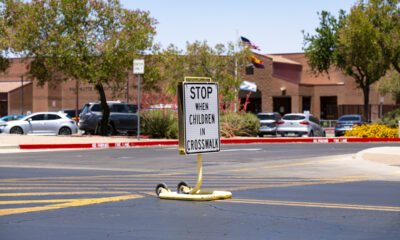artificial intelligence
College Students Walk a Tightrope of Curiosity and Caution Towards AI Amid Conflicting Signals from Schools and Employers

Rebeca Damico, a 21-year-old public relations student at the University of Utah, recalls the initial fear she felt following the release of ChatGPT in 2022. As her professors quickly instituted policies banning the AI tool, labeling it a form of plagiarism, she found herself wrestling with ethical dilemmas.
Damico, who originally studied journalism, viewed the advent of generative AI as a significant threat to the writing industry. “The temptation to use AI for assignments is palpable,” she stated, reflecting on how quickly a term paper could be written with AI assistance. While she knows of peers who have taken that shortcut, she remains wary of the consequences, highlighting a broader concern among students navigating the murky waters of academic integrity.
Students today face conflicting messages as they grapple with professors’ stern warnings against AI use while simultaneously acknowledging the growing demand for AI competence in the job market. A recent World Economic Forum report revealed that 75% of workers now utilize AI in their roles, prompting shifts in hiring practices that prioritize AI skills alongside traditional experience.
The University of Utah has adopted a proactive stance towards AI, integrating guidelines into its student handbook. These guidelines define AI use without proper citation as cheating and recommend additional detection tools for educators to enforce academic policies. However, while some professors maintain rigid stances against AI, others are beginning to incorporate it into their teaching frameworks, fostering a more nuanced environment.
Contrasting approaches illuminate the divergent views on AI in higher education. Institutions like Stanford acknowledge students’ likely interactions with AI, allowing for limited use under defined circumstances. In contrast, Morgan State University’s Virginia Byrne encourages her students to critically evaluate AI technologies, promoting projects that assess their practical strengths and limitations.
Byrne’s research interests connect with broader examinations of AI’s role in education, raising questions about its ethical implications. “It’s essential to foster trust in AI capabilities, yet we need to remain vigilant about the expectations we set for students,” Byrne commented, emphasizing the need for a balanced perspective on AI’s potential.
Industry experts like Theresa Fesinstine, who instructs AI applications within business contexts, observe a mixed understanding of AI among students. Many enter her classes with minimal familiarity with the technology, largely due to prevalent misconceptions surrounding its usefulness. This landscape of trepidation often stems from a lack of proper training in how to utilize AI effectively.
Outside of the classroom, students are increasingly finding tangible utility in AI. MBA student Shriya Boppana uses AI daily for various tasks, from scheduling to collaboration in group projects. Initially hesitant, she now recognizes AI’s role in boosting efficiency while remaining cautious about its limitations in producing personalized content.
Amidst these advancements, students express a healthy skepticism regarding AI’s implications for their future careers. Parris Haynes, a junior at Morgan State University, acknowledges the pressure of academic demands but insists on preserving his engagement with philosophy without relying on AI. “It’s not just about the end result; it’s about the joy of the process,” he affirmed.
Damico’s perspective has evolved since the release of ChatGPT. Now interning with a PR firm, she actively explores AI as a valuable resource for creative brainstorming and research, although she maintains a strict boundary against using it for academic writing. “It gives you a competitive edge,” she remarked, recognizing the need for AI literacy in her field.
As more students prepare to enter the workforce, they carry a mix of curiosity and caution regarding AI’s role. Boppana, looking ahead to a career in AI development, sees boundless opportunities. “AI can revolutionize many fields; it’s essential to learn how to integrate these tools to enhance human capabilities,” she noted, capturing the optimistic outlook shared by many of her generation.


















